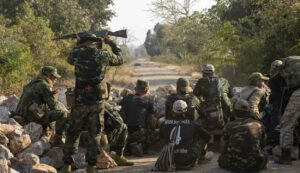The area remained largely peaceful during the intervening night of May 11 and May 12, the army said
Srinagar: The area has mostly stayed tranquil during the intervening nights of May 11 and May 12, the Army said, after the turmoil and several clashes that had kept the people along the northern and western International Borders (IB) up throughout the night for the previous few days.

The Army claims that there have been no reports of violations of the cessation of hostilities in the Jammu and Kashmir region or other regions near the Indian border.
According to the army, this was the first quiet night in a few days after Pakistan responded to India’s Operation Sindoor, which was launched in retaliation for the April 22 terror attacks that destroyed important terror sites in Pakistan and Pakistan-occupied Kashmir (PoK) with cross-border firing, heavy artillery shelling, and drone attacks.
“In Jammu and Kashmir and other places near the international border, the night stayed mostly calm. It’s the first quiet night in days,” the Indian Army said, adding that no incidents had been recorded.
Due to Pakistan’s intense shelling and attempted drone assaults, which were intended to disturb the tranquility in the area, the border areas of Jammu and Kashmir, Rajasthan, Punjab, and Gujarat have been experiencing chaotic and restless nights for the last several days.
The Indian Armed Forces acknowledged the destruction of 11 air bases within Pakistan and seriously damaged their military capability in response to these operations.
The main results of India’s Operation Sindoor were jointly announced by Vice Admiral A. N. Pramod, Director of Naval Operations; Lieutenant General Rajeev Ghai, Director of Military Operations; and Air Marshal A. K. Bharti, Director of Air Operations, during a news conference on Sunday. They said that during the operation on May 7, more than 100 terrorists were killed by precision strikes.
India can target any system at Pakistani bases, according to Air Marshal AK Bharti, who emphasized the nation’s military might. He said that on the evening of May 8 and May 9, beginning at 22:30, Pakistan began a huge drone strike on Indian towns along the western border from Srinagar to Naliya.
The Air Marshal said that since Indian air defense troops were ready, they were able to effectively thwart the drone assaults and spare the targeted targets any harm.
“We can target all of the systems at these (Pak) bases and more. But it was only a calculated reaction to teach our enemy to be wise and not go further. He claimed that the IAF’s reaction avoided civilian casualties and collateral damage by focusing only on military sites.
“We decided to hit where it would hurt, so we launched a quick, well-planned, and precise assault on its air bases, command centers, military installations, and air defense systems along the Western Front. We made it clear that bases such as Chaklala, Rafiq, and Rahim Yar Khan would not tolerate aggression. Strikes at Sargodha, Bhulari, and Jacobabad ensued,” he said.
“Our aim was not to inflict casualties, but in case there have been, it is for them to count,” the Air Marshal said when questioned about Pakistan’s part in the conflict. Reaching the goal is our responsibility, not counting the corpse bags.
According to Lieutenant General Ghai, the armed forces in Pakistan and Pakistan-Occupied Kashmir (PoK) carried out precision strikes on May 7 that killed over 100 terrorists, including those responsible for the 2019 Pulwama terror attack and the 1999 hijacking of Indian Airlines flight (IC-814).